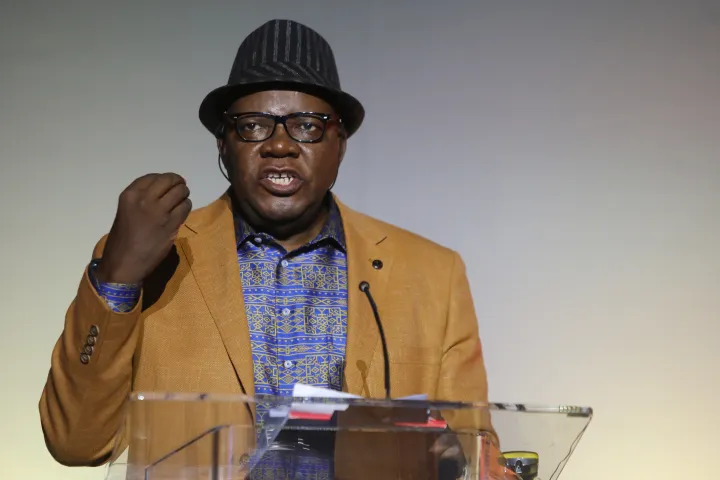CAPE TOWN, South Africa – Former Zimbabwean finance minister Tendai Biti, has warned South Africans to use their votes on May 29 to prevent South Africa from going the same way as his country — and other regional countries ruled by liberation movements.
Speaking at the Daily Maverick’s Gathering Twenty 2024 in Cape Town on Thursday, Biti, now the second vice president of the opposition Citizens Coalition for Change said all six former liberation movements of Southern Africa were gripped by the same liberation ethos which was a preoccupation with power rather than the development of their countries and their people.
Unless the ANC transformed itself, it was in danger of dying the way the United National Independence Party (Unip), the independence movement of Zambia and Kanu, the independence movement of Kenya, had died, Biti said.
“The liberation movement that fails to transform, the liberation movement that fails to democratise itself..atrophies, it disappears.
“And I think you are seeing slowly here in South Africa the withering of the liberation movement,” he added, noting the decline in ANC electoral support from the high levels under Mandela to May 2024, when “if they get 40% or 44%, they would have done very well.”
Biti said he believed that if the South African liberal author Alan Paton, who wrote the seminal pre-apartheid novel Cry the Beloved Country in 1948, were to be resurrected and wrote a novel set in present-day South Africa “the title of his new novel would probably be Scream, My Beloved Country”.
“So the acceleration of South Africa towards a state of state failure is beholding and bewildering to many Africans who live north of the Limpopo because of the huge vast resources that your country has,” including a gross domestic product of almost $500-billion, Biti said.
“But the story of South Africa is a story that has been narrated and lived in much of Africa, where it’s been characteristic of state failure, of pseudo-elections, the ritual of elections that are held every five years.”
There will be 19 elections in Africa this year, including five in southern Africa in South Africa, Botswana, Namibia, Mozambique and Mauritius.
Yet most elections since independence in Africa have made no difference and often served as mere rituals.
Part of the challenge in South Africa was the dominance of the liberation ethos — as it was in Zimbabwe under Zanu-PF, in Angola under MPLA, in Mozambique under Frelimo, in Namibia under Swapo and in Tanzania under Chama Cha Mapinduzi. (CCM)
He said over 200,000 citizens in the sub-Saharan region lived under the liberation movement.
And the problem with the liberation movements was that they were geared to liberate but not to transform and economically liberate their citizens. So most still lived in poverty.
Part of the problem, Biti added, was that the liberation movements were concerned with power for power’s sake instead of power to develop the economy.
The liberation movements had all been driven by the pursuit of power at any cost, the personal aggrandisement of their own leaders and the failure to build the nation-state “in the sense of a cohesive, social fabric which brings every individual, every ethnic group together”.
And because they had failed to transform and to deliver jobs, they had resorted to a primitive accumulation culture of entitlement, the culture of “we are entitled to tenders and huge contracts because we liberated you”.
He said in Zimbabwe, one could not get a job or a contract in the public service unless one had participated in the liberation struggle.
In all these countries, there was rule of law for others and rule by law — or impunity — for the leaders.
“Firstly is the weaponisation of poverty, the weaponisation of harm.
“Sixty-nine per cent of the poorest people in South Africa vote for the ANC.
“In Zimbabwe, where I come from, the ruling party finds dominance in the rural areas where poverty is the order of the day.
“So poverty is weaponised. Ignorance is weaponised.”
Biti said building a strong development of states in which entrepreneurship and capital are allowed to flourish is key.
“Because when a person has a job, when a person can go into a supermarket and be able to put food on this table, he or she will not be owned by any political party and any political person.
“And here, the liberation movement has been very careful.
“It has not allowed the emerging of independent black capital, which can hold it to account.
“What, in fact, it has allowed, is the emerging of a parasitic black capital that owes its survival to it through tenders.
“So, the independent black bourgeois, independent black capital is not allowed to exist because independent black capital becomes a threat himself to power.”
Biti said in Zimbabwe the constitution was no more than a worthless piece of paper whereas South Africa had been saved by the courts in upholding its constitution.
He said in other regional countries the citizen bore some responsibility for state failure because he or she had allowed the liberation movements to seize complete control.
In South Africa, there was still hope “but the citizen must play his role”, he said.
“And I hope that the citizens gathered here will understand that on the 29th of May, you have a historical mission of taking your fate back into your own hands.”
















